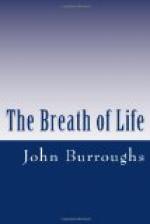If all this is interpreted to mean that life, that the mind and soul of man, are of material origin, science does not shrink from the inference. Only the inference demands a newer and higher conception of matter—the conception that Tyndall expressed when he wrote the word with a capital M, and declared that Matter was “at bottom essentially mystical and transcendental”; that Goethe expressed when he called matter “the living garment of God”; and that Whitman expressed when he said that the soul and the body were one. The materialism of the great seers and prophets of science who penetrate into the true inwardness of matter, who see through the veil of its gross obstructive forms and behold it translated into pure energy, need disturb no one.
In our religious culture we have beggared matter that we might exalt spirit; we have bankrupted earth that we might enrich heaven; we have debased the body that we might glorify the soul. But science has changed all this. Mankind can never again rest in the old crude dualism. The Devil has had his day, and the terrible Hebrew Jehovah has had his day; the divinities of this world are now having their day.
The puzzle or the contradiction in the naturalistic view of life appears when we try to think of a being as a part of Nature, having his genesis in her material forces, who is yet able to master and direct Nature, reversing her processes and defeating her ends, opposing his will to her fatalism, his mercy to her cruelty—in short, a being who thinks, dreams, aspires, loves truth, justice, goodness, and sits in judgment upon the very gods he worships. Must he not bring a new force, an alien power? Can a part be greater than the whole? Can the psychic dominate the physical out of which it came? Again we have only to enlarge our conception of the physical—the natural—or make our faith measure up to the demands of reason. Our reason demands that the natural order be all-inclusive. Can our faith in the divinity of matter measure up to this standard? Not till we free ourselves from the inherited prejudices which have grown up from our everyday struggles with gross matter. We must follow the guidance of science till we penetrate this husk and see its real mystical and transcendental character, as Tyndall did.
When we have followed matter from mass to molecule, from molecule to atom, from atom to electron, and seen it in effect dematerialized,—seen it in its fourth or ethereal, I had almost said spiritual, state,—when we have grasped the wonder of radio-activity, and the atomic transformations that attend it, we shall have a conception of the potencies and possibilities of matter that robs scientific materialism of most of its ugliness. Of course, no deductions of science can satisfy our longings for something kindred to our own spirits in the universe. But neither our telescopes nor our microscopes reveal such a reality. Is this longing only the result of our inevitable anthropomorphism, or is it the evidence of things unseen, the substance of things hoped for, the prophecy of our kinship with the farthest star? Can soul arise out of a soulless universe?




